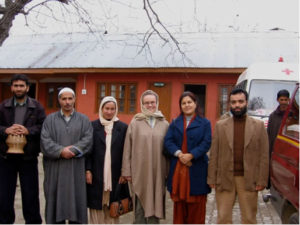Healing Minds Foundation
The Idea
As I witnessed this cruel trajectory of mental illness it became clear that one of the highest costs of this conflict to the Government of India would be the budget for mental health, and most specifically the many and varied disorders associated with post-traumatic stress disorder, otherwise known as PTSD.
PTSD is an acronym that makes many people either roll their eyes, or even argue that this is a modern invention, a by-product of our softening society. I would counter this by suggesting that these doubters have probably not witnessed war: they have not seen their children being blown up; they have not had their son delivered to their doorstep, his body barely recognisable; they have not been raped, over and over by ten or fifteen soldiers during a military crackdown. Those suffering from these brutal realities of war rarely manage to slot back into their lives, or, to put it as someone expressed it to me in their need to disprove the existence of PTSD, ‘couldn’t they just pull themselves together and get on with their lives?’
The answer is no, they cannot. The shock of these things often results in a nervous breakdown, reducing the individual to a barely functioning state in which they cannot look after themselves, let alone carry on whatever work they were previously doing in order to support themselves and their families.
Several psychiatrists in the state, including the senior psychiatrist Dr Musthaq Margoob, claim that up to 90% of the Valley’s population of around six million has been affected by some level of post traumatic or depressive disorder.
To put it in simple terms, it is not possible to rebuild a society that is only functioning partially on a mental level.
The government response to the huge numbers has been to medicate the problem, literally, with very high doses of tranquilisers, sedatives, anti-psychotics and anti-depressant drugs. The side effects of many of these high doses have been as difficult to manage as the disorders they have been prescribed to treat.
The more I spoke to psychiatrists, psychologists and therapists who specialise in trauma treatment, the more apparent it became that an integrated approach was needed for these people to recover, and find their way back to a quality of life that would allow the society as a whole to begin to progress and heal.
The idea of combining conventional and alternative therapies was the route that I wanted to pursue, but on the condition that it could be done with the full participation of local doctors and psychiatrists. For a project like this to work it has to be sustainable, and for local people to have ownership. It will not survive if it is simply an import from the outside. But most of the psychiatrists I spoke to in Kashmir barely had time to breathe, let alone think beyond the prescription pad. Typically they were seeing up to 200 patients a day.
Then in 2007 I met Dr Arshad Hussain, a psychiatrist at the Government Psychiatric Diseases Hospital, and lecturer at the government teaching hospital. Though he was in his early thirties he had a depth of understanding that went beyond his training and experience. Unlike many in the medical profession in India, Dr Arshad was not from the successful and educated middle class, a stratum that can afford the high costs associated with qualifying in this profession. Dr Arshad is from a village in Kashmir, one of those particularly badly affected by the conflict. He came from the same kind of place and situation as so many of his patients. Not only was he open to the idea of addressing mental health holistically, but he saw it as being vital for progress in mental health in Kashmir.

With local doctors at the government clinic where we are practicing in Pakher Pora, Kashmir Valley
Our aim is to treat trauma patients with a combination of conventional and alternative medication and therapies that will support the fullest recovery they can make, and enable them to return to their families and communities.

At the hospital with (centre) Paul Fadden, Reiki practitioner, and (right) Dr Arshad Hussain
